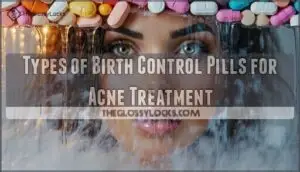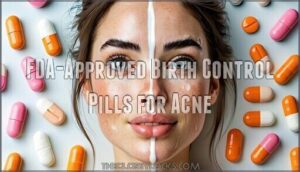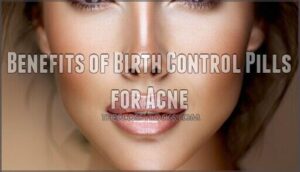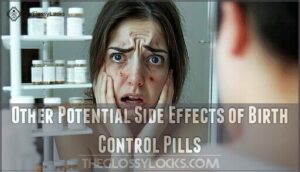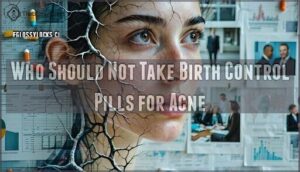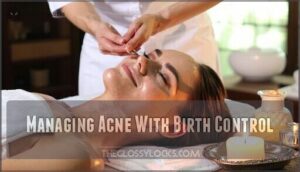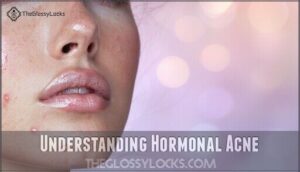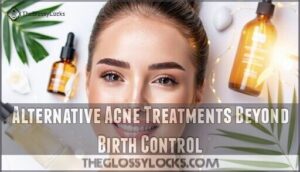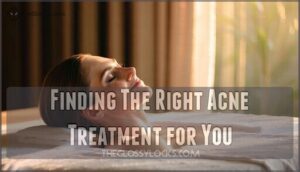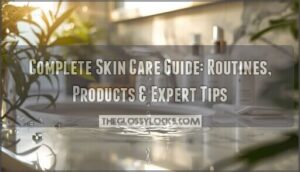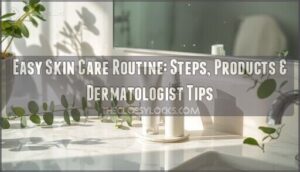This site is supported by our readers. We may earn a commission, at no cost to you, if you purchase through links.
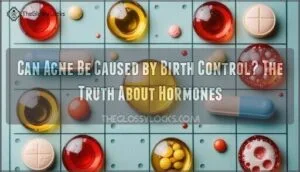
Hormonal contraceptives containing synthetic progestins can trigger breakouts by mimicking androgens (male hormones) that stimulate oil production in your skin.
This includes birth control pills, patches, shots, rings, implants, and hormonal IUDs.
However, some birth control formulations actually help clear acne by balancing hormone levels.
The key lies in the type of progestin used – some are more "androgenic" than others.
Your skin’s reaction depends on your individual hormone sensitivity and the specific contraceptive formula.
It’s like a hormonal game of chance where your skin holds the cards.
Table Of Contents
- Key Takeaways
- Birth Control and Acne: What’s The Connection?
- How Birth Control Pills Affect Acne
- Risks and Side Effects of Birth Control for Acne
- Managing Acne With Birth Control
- Understanding Hormonal Acne
- Alternative Acne Treatments Beyond Birth Control
- Finding The Right Acne Treatment for You
- Frequently Asked Questions (FAQs)
- Can birth control cause acne?
- Are birth control pills good for acne?
- Can birth control reduce breakouts from hormonal acne?
- Can Oral contraceptives cause acne?
- Do birth control pills clear up acne overnight?
- Should I take birth control if I have acne during my period?
- Which birth control pills cause acne?
- How do I get rid of acne from birth control?
- Can birth control make you break up?
- Why am I suddenly breaking out on the pill?
- Conclusion
Key Takeaways
- Hormonal contraceptives can trigger acne breakouts – Methods containing synthetic progestins (like pills, patches, IUDs, and implants) can mimic androgens and increase oil production, leading to clogged pores and new breakouts.
- The type of progestin matters for your skin – Progestin-only methods often worsen acne since they lack estrogen’s protective effects, while combination pills with estrogen typically help clear breakouts by balancing hormone levels.
- FDA-approved birth control pills can treat acne – Four specific combination pills (Ortho Tri-Cyclen, Estrostep Fe, Yaz, and Beyaz) are approved for acne treatment and work by reducing androgen levels and sebum production.
- You’ll need patience to see results – If you’re using birth control to treat acne, expect to wait 2-3 months for initial improvements and up to 6 months for best results, as your skin needs time to adjust to lower hormone levels.
Birth Control and Acne: What’s The Connection?
You might wonder if your birth control is causing those frustrating breakouts on your face.
The relationship between hormonal contraception and acne is complex, with some methods clearing your skin while others can trigger more pimples.
Hormonal Fluctuations and Acne
Your body’s hormonal fluctuations create a complex dance that directly impacts your skin health.
Your hormones and skin are locked in a constant conversation that determines whether you wake up to clear skin or new breakouts.
When hormone balance shifts—whether from menstrual cycles, stress, or birth control—it triggers a cascade of changes affecting acne triggers and overall skin condition.
Here’s how hormonal changes impact your skin:
- Estrogen levels drop before menstruation, reducing skin’s natural oil control
- Testosterone spikes increase sebum production, clogging pores and creating breakouts
- Hormonal imbalance acne typically appears on jawline, chin, and cheeks
- Birth control acne causes vary depending on whether methods contain estrogen or progestin only
- Acne caused by hormones often follows predictable patterns tied to your cycle
Understanding these connections helps you recognize when hormonal acne treatment might be necessary for managing stubborn breakouts.
How Androgens and Estrogen Affect Acne
Your skin’s oil production depends on a delicate hormone balance between androgens and estrogen.
Androgens ramp up sebum production, creating the perfect storm for hormonal acne through clogged pores.
Estrogen effects work differently—they actually dial down oil production and keep androgen impact in check.
When hormonal imbalance acne strikes, it’s usually because androgens are calling the shots while estrogen takes a backseat, leaving your skin health compromised.
The Role of Progestin in Acne Treatment
Progestin plays a complex role in hormonal acne treatment, acting as both friend and foe depending on the type.
Not all progestins are created equal—some clear your skin while others create chaos.
Here’s how different progestins affect your skin health:
- Androgenic progestins (like levonorgestrel) can worsen acne by mimicking testosterone effects
- Anti-androgenic progestins (like drospirenone) help reduce oil production and clear breakouts
- Neutral progestins (like norgestimate) have minimal impact on acne mechanisms
- Progestin-only methods often increase acne since they lack estrogen’s protective effects
Understanding these progestin types helps you choose the right hormonal contraception for better hormone balance and clearer skin.
How Birth Control Pills Affect Acne
You’ve probably heard conflicting stories about birth control and acne – some say it helps, others claim it makes breakouts worse.
The truth is that different types of birth control pills affect your skin in very different ways, and understanding these differences can help you make the right choice for clearer skin.
Types of Birth Control Pills for Acne Treatment
Not all birth control pills work the same way for acne treatment.
When choosing acne birth control pills, you’ll want to understand your options:
- Combination pills contain estrogen and progestin, offering monophasic benefits through steady hormone levels that reduce androgen activity and sebum production.
- Progestin-only pills may worsen acne due to progestin effects that can mimic androgens, making them less ideal for acne treatment.
- Drospirenone-containing pills show superior drospirenone efficacy against acne compared to other formulations, though many combination pills work as effective off-label options for pill selection.
Some pills are even FDA-approved for acne treatment.
FDA-Approved Birth Control Pills for Acne
When tackling acne, the US Food and Drug Administration has approved four specific birth control pills for acne treatment.
These acne birth control pills – Ortho Tri-Cyclen, Estrostep Fe, Yaz, and Beyaz – contain both estrogen and progestin.
Brand comparisons show similar pill effectiveness across FDA-approved options.
The approval process guarantees these medications meet strict safety standards for acne and birth control combined therapy.
These pills work by reducing androgen levels, which subsequently decreases sebum production.
Benefits of Birth Control Pills for Acne
Beyond FDA approval, birth control pills offer remarkable benefits for acne-prone skin.
- Reduced Breakouts: Combination pills decrease androgen levels, leading to substantially fewer pimples and clogged pores through effective oil control.
- Clearer Skin: Lower sebum production means less inflammation and redness, resulting in visibly smoother, healthier-looking skin.
- Hormonal Regulation: Pills stabilize monthly hormone fluctuations that trigger breakouts, providing consistent acne control.
- Confidence Boost: Clearer skin often translates to improved self-esteem and comfort in social situations.
Risks and Side Effects of Birth Control for Acne
While birth control pills can effectively treat acne, you should understand the potential health risks before starting treatment.
Serious side effects include increased risk of blood clots, stroke, and heart attack, especially if you smoke or have certain medical conditions.
Increased Risk of Blood Clots and Heart Attack
While birth control pills effectively treat acne, they carry cardiovascular disease risks you should know about.
Combined pills increase blood clots risk 2-6 times compared to non-users.
Age-Related Risks matter—women over 35 face higher dangers, especially smokers.
Pill Type Matters too; estrogen-containing methods pose greater risks than progestin-only Alternative Options.
Understanding these birth control side effects helps you make informed decisions about pregnancy risk versus potential complications.
Other Potential Side Effects of Birth Control Pills
While blood clots pose serious risks, oral contraceptives can trigger additional side effects that affect your daily life.
Your body might respond to hormonal birth control with various reactions that range from mildly annoying to genuinely disruptive.
Common birth control side effects include:
- Mood Changes – irritability, depression, or anxiety fluctuations
- Weight Fluctuations – temporary water retention or appetite changes
- Nausea – especially during the first few months of use
- Breast Tenderness – sensitivity that typically decreases over time
- Headaches – ranging from mild to severe migraine-like symptoms
These hormonal birth control reactions usually improve within three months as your body adjusts to the new hormone levels.
Some may also experience changes in hair, since hormones impact hair.
Who Should Not Take Birth Control Pills for Acne
Your doctor’s assessment matters before starting birth control for acne treatment.
Women with specific health risk factors shouldn’t use combination pills due to serious contraindications explained below.
Family history of blood clots, heart disease, or stroke increases risks substantially.
Pill interactions with certain medications can reduce effectiveness, requiring alternative options for safe birth control acne management.
| Contraindication | Why It Matters |
|---|---|
| Smoking over 35 | Increases heart attack risk 80% |
| Blood clot history | Estrogen raises clotting risk |
| Liver disease | Pills processed through liver |
| Uncontrolled hypertension | Stroke risk increases substantially |
| Pregnancy/breastfeeding | Hormones affect fetal development |
Managing Acne With Birth Control
When combining birth control with acne treatment, you’ll need a thorough approach that addresses both hormonal and topical factors.
Your healthcare provider can help create a personalized plan that maximizes effectiveness while minimizing side effects through regular monitoring and adjustments, ensuring a thorough approach to your treatment.
Combining Birth Control With Other Acne Treatments
Why settle for just birth control when you can create a powerful acne treatment combo? Pairing birth control acne treatment with other therapies maximizes your skin-clearing potential.
Here are five effective topical combinations and acne treatment options to discuss with your doctor:
- Topical combinations – Benzoyl peroxide or salicylic acid cleansers with retinoids for enhanced pore-clearing action
- Oral medication – Antibiotics like doxycycline to reduce inflammation and bacterial growth
- Light therapy – Blue light treatments that target acne-causing bacteria without harsh chemicals
- Isotretinoin usage – Reserved for severe cases when other acne medications haven’t worked effectively
- Dietary changes – Reducing dairy and high-glycemic foods that may trigger hormonal fluctuations
For severe cases, isotretinoin offers resolution after one treatment.
Lifestyle Changes to Support Acne Management
Supporting your acne management journey requires smart lifestyle changes that work hand-in-hand with birth control.
Focus on Diet and Acne connections by eating whole foods and limiting dairy or high-glycemic options.
Prioritize Sleep Quality and Stress Reduction through regular exercise and relaxation techniques.
Maintain consistent Hydration Levels and establish a gentle Skincare Routine with non-comedogenic products to optimize your skin health.
Importance of Regular Check-Ins With a Doctor
Monitoring your birth control acne relief journey isn’t just smart—it’s essential for long-term success.
Regular dermatology visits help track treatment effectiveness and catch potential issues early. Your doctor can fine-tune your hormonal acne management plan based on your body’s unique response.
- Monitoring Side Effects: Report any new symptoms or changes in how you feel on birth control
- Adjusting Dosage: Your doctor may modify your prescription based on your skin’s response to treatment
- Personalized Advice: Get customized recommendations for combining birth control with other acne treatments for ideal results
Understanding Hormonal Acne
You might notice your skin breaking out more during certain times of the month, and there’s a scientific reason behind these frustrating flare-ups.
Hormonal acne happens when your body’s natural hormone fluctuations trigger your oil glands to go into overdrive, creating the perfect storm for clogged pores and breakouts, which can be considered a type of acne.
What Triggers Hormonal Acne
Several factors can trigger hormonal acne, creating a perfect storm for breakouts. Understanding these triggers helps you take control of your skin health.
Common Hormonal Acne Triggers:
| Trigger | Impact on Skin | Management Strategy |
|---|---|---|
| Stress Effects | Elevates cortisol, increasing sebum production and pore clogging | Practice meditation, exercise regularly |
| Menstrual Cycle | Fluctuating estrogen/progesterone causes inflammation and breakouts | Track cycles, consider birth control |
| Poor Sleep | Disrupts hormone balance, worsening acne from hormones | Maintain 7-8 hours nightly |
Hormonal changes during your menstrual cycle create the biggest impact. When estrogen drops and androgens rise, your sebaceous glands go into overdrive, producing excess sebum that clogs pores.
This hormone imbalance triggers inflammation, leading to those stubborn jawline breakouts. Stress compounds the problem by releasing cortisol, which stimulates oil production.
Even dietary factors like dairy can influence hormonal acne by affecting insulin levels. Acne can also be triggered by environmental factors affecting skin, such as humidity and pollution.
Recognizing these patterns empowers you to make targeted lifestyle changes that support clearer skin.
How Hormonal Imbalance Affects Acne
When hormones get out of whack, your skin becomes a battlefield.
Hormonal imbalance triggers acne by disrupting the delicate balance between androgens and estrogen, leading to increased sebum production and inflammation.
Here’s how hormonal imbalance affects your skin:
- Elevated androgens stimulate oil glands, creating perfect conditions for breakouts
- Decreased estrogen reduces skin’s natural protective barrier and hydration
- Insulin spikes from high-glycemic foods amplify acne severity
- Stress hormones like cortisol worsen inflammation and trigger cycle changes
- Thyroid dysfunction disrupts lipid production, affecting overall skin health
The hormone-acne link is strongest during puberty, menstruation, and menopause when fluctuations peak.
Understanding this connection helps you work with your doctor to find targeted treatments, including birth control options that can restore hormonal balance.
Common Symptoms of Hormonal Acne
When hormonal imbalances wreak havoc on your skin, the symptoms are hard to miss. Hormonal acne presents distinct patterns that set it apart from regular breakouts, making identification easier once you know what to look for.
Breakout locations typically concentrate around your jawline, chin, and lower cheeks – areas where hormonal fluctuations hit hardest. These skin breakouts often coincide with your menstrual cycle, appearing like clockwork before or during your period.
Hormonal acne symptoms include:
- Deep, painful cysts that feel tender to touch
- Persistent inflammation that resists typical treatments
- Acne severity that fluctuates with monthly hormone changes
- Skin sensitivity that makes your usual products suddenly irritating
- Emotional impact from unpredictable, stubborn breakouts
These symptoms create a frustrating cycle where your skin feels completely out of control, regardless of your skincare routine’s consistency.
Alternative Acne Treatments Beyond Birth Control
If birth control isn’t the right fit for your acne, you’ve got plenty of other proven options to explore.
From prescription creams to advanced laser treatments, these alternatives can effectively target breakouts without hormonal side effects, making them a great alternative to consider.
Topical Treatments for Acne
Topical retinoids like tretinoin tackle acne by unclogging pores and speeding cell turnover.
Benzoyl peroxide kills acne bacteria, while salicylic acid dissolves dead skin cells.
Azelaic acid reduces inflammation and topical antibiotics fight bacterial infections.
These skin care products work differently, so finding your perfect acne treatment combination takes patience and experimentation.
Many people find success using products for this condition.
Oral Medications for Severe Acne
When severe acne resists topical treatments, oral medications provide powerful alternatives.
These systemic therapies target inflammation from within, offering hope for stubborn breakouts that won’t budge with creams alone.
Oral antibiotics like doxycycline reduce inflammation but require careful monitoring to prevent antibiotic resistance.
For those exploring this option, consider purchasing oral options.
Isotretinoin treatment remains the gold standard for severe cases, though systemic side effects need close supervision.
Spironolactone blocks hormones driving hormonal acne in women.
Combination therapy pairs oral medications with topical treatments for enhanced results.
Treatment duration varies substantially—antibiotics work within weeks, while isotretinoin requires months of commitment.
Your dermatologist will consider medication interactions with birth control and other prescriptions.
These oral medications pack more punch than topical solutions but demand respect for their potential side effects.
Think of them as heavy artillery in your acne treatment arsenal.
Laser and Light Therapy for Acne
Light therapy’s effectiveness shines brightest for mild-to-moderate acne treatment.
Blue light targets acne-causing bacteria, while red light reduces inflammation.
Laser types include fractional and IPL, offering different treatment efficacy levels.
Most dermatology clinics combine therapies for enhanced results.
Potential risks include temporary redness and skin sensitivity.
Sessions typically cost $100-$500, requiring multiple treatments for ideal skin care outcomes.
Treatment Cost Side Effects
Finding The Right Acne Treatment for You
When you’re dealing with persistent acne, working with a healthcare professional makes all the difference in finding an effective treatment plan.
Your doctor can evaluate your specific situation, consider your medical history, and help you weigh the benefits and risks of different approaches to get your skin back on track.
Consulting a Doctor or Dermatologist for Acne Concerns
While over-the-counter treatments can help mild breakouts, persistent acne often requires professional evaluation.
Don’t wait if your acne hasn’t improved after eight weeks of home treatment—that’s when it’s time to call in reinforcements. A dermatologist can assess acne severity and develop personalized treatment plans that target your specific skin concerns.
Professional acne treatment offers several advantages:
- Prescription medications like topical retinoids, oral antibiotics, or hormonal therapies that aren’t available over-the-counter
- In-office procedures including chemical peels, laser therapy, and extractions for stubborn breakouts
Your dermatologist will review medication interactions, recommend appropriate skincare routines, and monitor treatment expectations.
For severe cases, dermatologists may suggest isotretinoin for resolution. They can also determine if specialist referrals are needed for underlying hormonal issues contributing to your acne.
Importance of Open Communication and Patience
After consulting your doctor, maintaining open communication becomes your strongest ally in conquering acne.
Share your treatment expectations honestly – whether you’re hoping birth control will clear hormonal acne or just reduce breakouts.
Consistent adherence to your contraceptive routine matters more than switching treatments frequently.
Remember, your mental wellbeing deserves attention too, so don’t hesitate to discuss concerns with partner support.
| Communication Focus | Why It Matters |
|---|---|
| Treatment timeline | Sets realistic expectations |
| Side effects | Helps adjust approach |
| Progress tracking | Guides treatment decisions |
Holistic Approach to Acne Management
Managing acne effectively requires addressing multiple factors beyond just hormonal acne solutions.
While birth control helps with acne hormone regulation, combining it with Diet and Acne modifications, Stress Reduction techniques, and Natural Remedies creates a thorough strategy.
Focus on Gut Health through probiotics, maintain quality Sleep Quality, and establish consistent skincare routines.
This integrated approach tackles acne and hormone imbalance from all angles, offering better long-term hormonal acne prevention than relying on medication alone.
Frequently Asked Questions (FAQs)
Can birth control cause acne?
Sarah switched from combination pills to a progestin-only method and watched her clear skin transform into persistent breakouts.
Yes, certain birth control can cause acne.
Progestin-only methods like IUDs, implants, and mini-pills can worsen acne by mimicking androgens and increasing oil production, which can lead to persistent breakouts.
Are birth control pills good for acne?
Yes, combination birth control pills containing estrogen and progestin can effectively treat acne by reducing androgen levels and oil production.
You’ll typically see skin improvements within a few months of starting treatment.
Can birth control reduce breakouts from hormonal acne?
While you might think birth control always worsens acne, combination pills with estrogen and progestin actually reduce breakouts.
They lower androgen levels, decreasing oil production that clogs pores and triggers hormonal acne, by reducing breakouts through the effect of the combination pills.
Can Oral contraceptives cause acne?
Progestin-only oral contraceptives can worsen acne by mimicking androgens and increasing oil production. However, combination pills containing estrogen typically improve acne by reducing androgen levels and sebum production.
Do birth control pills clear up acne overnight?
Maria’s dermatologist prescribed combination birth control pills for her stubborn jawline acne, but she’ll need patience—hormonal changes don’t happen overnight.
You’ll typically see initial improvements after 2-3 months of consistent use, with best results taking up to 6 months.
Your skin needs time to adjust to lower androgen levels, which is crucial for achieving consistent use and letting the treatment work effectively.
Should I take birth control if I have acne during my period?
Combination birth control pills containing estrogen can help reduce period-related acne by lowering androgen levels and stabilizing hormones. However, progestin-only methods might worsen breakouts for some women.
Which birth control pills cause acne?
Progestin-only pills, hormonal IUDs, implants, and injections can worsen acne by mimicking androgens and increasing oil production. These methods lack estrogen, which typically helps control breakouts.
How do I get rid of acne from birth control?
Time heals all wounds, but acne from birth control needs proactive treatment.
Switch to combination pills containing estrogen and progestin, which reduce androgen levels and oil production.
You’ll see clearer skin within three months.
Can birth control make you break up?
Birth control doesn’t directly cause breakups, but hormonal changes from certain methods can affect mood, libido, and emotional well-being, potentially straining relationships if not addressed openly.
Why am I suddenly breaking out on the pill?
Your pill might trigger breakouts due to hormonal fluctuations, especially if it’s progestin-only or you’re adjusting to a new formulation.
These hormone shifts can increase oil production, clogging pores and causing unexpected acne flare-ups.
Conclusion
Research shows that 85% of women experience acne flare-ups when starting hormonal contraceptives, yet many don’t realize the connection.
Understanding whether acne can be caused by birth control empowers you to make informed decisions about your skin and reproductive health.
Your hormonal journey is unique, and finding the right balance between contraception and clear skin requires patience and professional guidance.
Work closely with your healthcare provider to identify contraceptive options that support both your reproductive goals and skin health for desirable results.
- http://www.mayoclinic.org/diseases-conditions/acne/basics/definition/con-20020580
- http://www.aafp.org/afp/2004/0501/p2123.html
- http://www.cochrane.org/CD004425/FERTILREG_effect-of-birth-control-pills-on-acne-in-women
- https://my.clevelandclinic.org/health/articles/9132-premenstrual-dysphoric-disorder-pmdd
- https://oanahealth.com/

